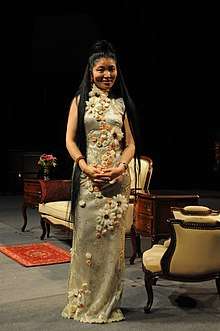Yungchen Lhamo
Yungchen Lhamo (Tibetan: དབྱངས་ཅན་ལྷ་མོ, lhamo meaning "goddess of song") is a Tibetan singer-songwriter living in the United States. She won an Australian Record Industry Association (ARIA) award for best folk/world/traditional album in 1995 and was then signed by Peter Gabriel's Real World record label.
Yungchen Lhamo | |
|---|---|
 | |
| Background information | |
| Born | 1960s |
| Origin | Lhasa, Tibet Autonomous Region, China |
| Genres | New-age, traditional, world |
| Years active | 1990–present |
| Labels | Real World Records |
| Website | yungchenlhamo |
Life and career
Lhamo's name means "goddess of song" (lhamo), a name given to her by a Buddhist monk.[1]
Lhamo left Tibet in 1989 to make a pilgrimage to Dharamsala.[2] She was inspired to reach out to the world through her music. She moved to Australia in 1993,[1] then to New York City in 2000.
Lhamo's Australian debut album, Tibetan Prayer, produced by John Prior, won the ARIA Music Awards for best folk/world/traditional music release in 1995.[3] The success of that record led to her signing with Peter Gabriel's Real World label. Her first record for the label, Tibet, Tibet, mainly features a cappella renditions of original compositions—authentic Tibetan Buddhist prayers and songs. Her next recording, Coming Home, was a collaboration with producer Hector Zazou, showcasing her voice and also featuring chanting by Tibetan monks, a wide range of mostly modern Western instruments and the benefits of multi-track recording which enabled Lhamo's voice to be layered repeatedly.
According to the Times Herald Record, Lhamo has toured extensively in at least 70 countries, singing a combination of her own songs and traditional Buddhist chants and mantras. She has performed and recorded with a number of other artists, including Natalie Merchant, Peter Gabriel, Annie Lennox, Billy Corgan, and Bono.[1] Lhamo's recordings have been used in the film Seven Years in Tibet and many Tibetan documentaries. She has performed at venues such as London's Royal Festival Hall, New York City's Carnegie Hall, and Berlin's Philharmonic Hall. She has also performed at the Lilith Fair festival and toured as a part of the WOMAD world music festivals.
Lhamo's album Ama (which means "Mother" in the Tibetan language) was released in April 2006 and was produced by Iranian-American musician Jamshied Sharifi. Featured artists include Annie Lennox on the song Fade Away[4] and Joy Askew on the song Tara.[5]
In November 2007, Lhamo accompanied a site-specific dance work called "Walking The Line" by American choreographer Bill T. Jones at the Louvre Museum in Paris. The performance, which also featured solo percussion by Florent Jodelet, took place in a 300-foot space stretching from Michelangelo's statute The Dying Slave to the foot of the staircase leading to the sculpture Winged Victory of Samothrace.[6]
Lhamo's fifth album, Tayatha (meaning "It Is Like This") was released in June 2013 by Cantaloupe Music. On this album she collaborated with Russian pianist Anton Batagov.[7]
Lhamo's work with mentally ill and homeless people was covered by Newsweek.[8]
Discography
- Tibetan Prayer (1995)
- Tibet, Tibet (1996)
- Coming Home (1998)
- Ama (2006)[9]
- Tayatha with Anton Batagov (2013)
References
- Horrigan, Jeremiah (March 25, 2013). "Acclaimed Tibetan singer now calls Kingston home". Times Herald-Record. Retrieved April 4, 2020.
- Musa, Helen (April 14, 1995). "Goddess sings of Tibetan pilgrims". Canberra Times (ACT : 1926 - 1995). p. 13. Retrieved April 4, 2020.
- "Winners by Year 1995". Australian Recording Industry Association (ARIA). Archived from the original on September 26, 2007. Retrieved December 4, 2013.
- Denselow, Robin (March 30, 2006). "Yungchen Lhamo, Ama". The Guardian. Retrieved April 7, 2020.
- "Rock/Pop Listings". The New York TImes. May 5, 2006. Retrieved April 7, 2020.
- Riding, Alan (November 24, 2007). "Serenading Sculptures in Dance at Louvre". The New York Times. Retrieved April 4, 2020.
- Lohr, Michael. "Yungchen Lhamo Interview". New Renaissance Magazine. Renaissance Universal. Retrieved July 1, 2014.
- "A Tibetan Singer Helps Mentally Ill Patients Find Their Voice", Newsweek,|July 10, 2015.
- Denselow, Robin (March 31, 2006). "CD: Yungchen Lhamo, Ama". The Guardian. ISSN 0261-3077. Retrieved April 4, 2020.
- Montague, Tony (July 24, 2008). "Treacherous Trek Led Lhamo to Musical Mountaintops". The Georgia Straight. Retrieved July 24, 2008. or ARCHIVED here at The Internet Archive
External links
| Wikimedia Commons has media related to Yungchen Lhamo. |